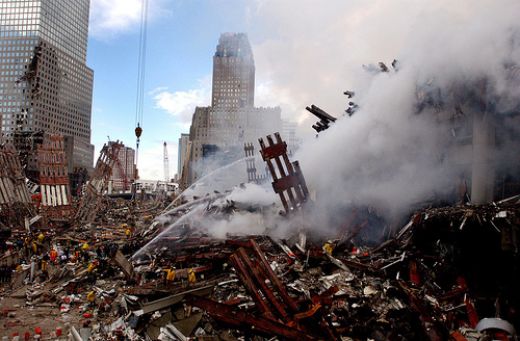

|
A
Field Guide U.S. Department of Health and Human Services |
A continuing education course for 2 ces
consisting of reading and taking a post-test on:
Mental
Health Response to Mass Violence and Terrorism Field
Guide
This Field Guide is intended for mental
health and disaster |
| This
Field Guide draws from material contained in Mental Health Response to Mass Violence and Terrorism: A Training Manual and highlights practical approaches. |

Fires still burn amidst the rubble and debris of the World Trade Centers
in New York City in the area know as Ground Zero two days after the 9/11
terrorists attacks.
DoD photo by: PH2 JIM WATSON, USN Date Shot: 13 Sep 2001
maintains responsibility for the program. |
|
A
Field Guide: Mental Health Response to Mass Violence
and Terrorism To provide Clinicians with:
|
Table of Contents Introduction .
. . . . . . . . . . . . . . . . . . . . . . . . . . . . . . .
. . . . . . . . . . . . . . . .vii |
This course consists of reading and taking a post-test on:
Mental Health Response to Mass Violence and Terrorism Field Guide
All material appearing in this volume except that taken directly from copyrighted sources is in the public domain and may be reproduced or copied without permission from the Substance Abuse and Mental Health Services Administration's (SAMHSA) Center for Substance Abuse Treatment (CSAT) or the authors. Citation of the source is appreciated.
We do adhere to the American Psychological Association's Ethical Principles of Psychologists. Our courses are carefully screened by the Planning Committee to adhere to APA standards. We also require authors who compose Internet courses specifically for us follow APA ethical standards. Many of our courses contain case material, and may use the methods of qualitative research and analysis, in-depth interviews and ethnographic studies. The psychotherapeutic techniques depicted may include play therapy, sandplay therapy, dream analysis, drawing analysis, client and therapist self-report, etc. The materials presented may be considered non-traditional and may be controversial, and may not have widespread endorsement within the profession. www.psychceu.com maintains responsibility for the program and its content. |
All material included in this course is either in the public domain, or used with express permission. |
Cost of the 2 unit course is $22
![]()
|
Thank you! |
888-777-3773
|
|

|